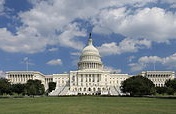US seeking superstate status for MNCs in India: report
25 Sep 2013
The United States wants multinational corporations (MNCs) to have the right to sue India abroad for settling disputes and has proposed to incorporate this clause in the bilateral investment pact, reports quoting reliable sources said today.
 The reports assume significance in the light of the government's move to dilute the nuclear liability clause in bilateral nuclear trade and the decision to hasten the finalisation of Bilateral Investment Promotion and Protection Agreement during Manmohan Singh's upcoming visit to the US.
The reports assume significance in the light of the government's move to dilute the nuclear liability clause in bilateral nuclear trade and the decision to hasten the finalisation of Bilateral Investment Promotion and Protection Agreement during Manmohan Singh's upcoming visit to the US.
A report in The Times of India quoting Biswajit Dhar, director general of the Research and Information System for Developing Countries, said there was growing pressure on the Indian government to incorporate a provision in an investment agreement with the US, which would allow multinational corporations to bypass the Supreme Court and sue the government in foreign tribunals.
The 'investor-state dispute settlement', which is a key element of the bilateral investment pact, will arm foreign investors operating in India with a slew of rights, the report noted.
"We understand that the US is insisting that we sign (the clause), which is a problem area as an investor can drag the state to an international arbitration panel if its investment and/or profits are at risk on account of some domestic regulation," the report quoted Dhar as saying.
While India has been eager to finalise the Bilateral Investment Promotion and Protection Agreement (BIPPA), New Delhi has so far insisted that Indian judiciary should have the final say in commercial disputes.
The US, however, has found this unacceptable, says Dhar.
In fact, the Indian government is of the view that there is an urgent need to review similar settlement clauses in some of the existing investment treaties with other countries and trading blocs as well.
Like India, most other emerging market economies like Brazil and South Africa are also opposed to the dispute settlement provision in investment pacts and the excessive focus on financial transactions and intellectual property rights.
India is already at the receiving end as a result of such focused bilateral agreements that seek to protect the interests of MNCs only. Already, several MNCs in India, including UK's Vodafone, have invoked provisions of bilateral investment pacts to enforce alleged violation of rights in India.
In another instance, US pharmaceutical company Eli Lilly is reported to have used provisions of bilateral investment pact to start proceedings against Canada in a foreign tribunal, claiming $500million compensation for invalidating patents on some of the company's best-selling medicines by a Canadian court.
Meanwhile, the US trade body has launched a massive ad campaign asking the Obama administration to raise the issue of India's alleged unfair trade practices.
"Manufacturers and Congress Agree: India must play fair on trade," says an advertisement issued by the National Association of Manufacturers (NAM) ahead of Prime Minister Manmohan Singh's US visit.
"At a time when Washington can't agree on much" there is "overwhelming bipartisan opposition to India's discriminatory trade practices," it said.
NAM has unleashed an ad blitz on digital and print media in Washington and New York.



















